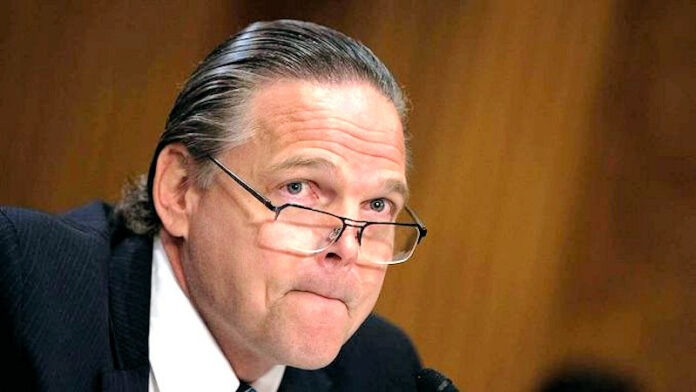Exactly two months after his appointment, long-time U.S. diplomat Daniel Foote has submitted his resignation as United States Special Envoy to Haiti, citing a “deeply flawed” U.S. policy toward the nation that includes continued “catastrophic” political intervention and the administration’s recent decision to ramp up deportations.
“I will not be associated with the United States inhumane, counterproductive decision to deport thousands of Haitian refugees,” Foote wrote in his resignation letter, which was sent to Secretary of State Antony Blinken on Sep. 22, 2021.
The resignation comes as the Biden administration pushes forward with one of the largest mass expulsions of asylum seekers in decades. [As of Sep. 28, there have been at least 43 flights from Texas to Haiti over the 10 days since Sep. 19, transporting close to 3,500 people. The Biden administration had cleared out the Del Rio, Texas border camp, where close to 15,000 people had gathered two weeks ago hoping to apply for asylum in the United States. – HL]. Although the administration has stated it is prioritizing single adults for deportation, flight manifests show that a significant portion of those sent to Haiti are families with young children.

The head of Haiti’s migration office, Jean Negot Bonheur Delva, has personally called for a moratorium on the flights. Delva, however, said the government was not in a position to make a formal request. “We need to understand that this is a relationship between a big and a small country,” he told the Washington Post.
[Meanwhile, Mathias Pierre, Haiti’s elections minister, told The Associated Press: “This is the first time we see a U.S. diplomat who has decided to go against the will of the U.S. government. We salute that.” – HL]
The Biden administration is facing increasing criticism from influential figures within the Democratic party, including Speaker of the House Nancy Pelosi and Senate leader Chuck Schumer. While the NAACP as well as many human rights organizations have denounced the anti-Black treatment of refugees witnessed at the southern border. Earlier in the week, border patrol agents on horseback charged at individuals and in some cases appeared to brandish their reins as whips.
“The events that took place yesterday are all too familiar to those that are aware of America’s ugly history,” NAACP President and CEO Derrick Johnson wrote, urging supporters to take action. “It is no secret that Haiti – the first Black republic – has been severely punished by western powers for centuries. This latest incident is nothing short of adding insult to injury.” The Haitian Bridge Alliance and Human Rights First noted this was the latest in a long history of discriminatory behavior toward Haitians seeking safety in the U.S..
Foote’s harsh words were not reserved for the administration’s immigration policy alone. Writing that his recommendations had been ignored or misrepresented to superiors, he called the general U.S. policy approach to Haiti “deeply flawed.”
In his resignation letter, Foote connects the broader migration crisis to U.S. policy in Haiti. While Haiti needs security and humanitarian assistance, “what our Haitian friends really want, and need, is the opportunity to chart their own course, without international puppeteering and favored candidates but with genuine support for that course,” Foote writes. “I do not believe that Haiti can enjoy stability until her citizens have the dignity of truly choosing their own leaders fairly and acceptably.”

Foote had been appointed to help oversee a review of U.S. policy in Haiti following pressure from members of Congress. “For decades, the international community has invested hundreds of millions of dollars to help Haiti achieve political stability and a representative democracy. In order to move forward more productively, we must acknowledge that these efforts have failed to achieve their desired results, and that continuing along the same path will only exacerbate the situation,” 68 members of Congress, led by Chairman of the House Foreign Affairs Committee, Gregory Meeks, wrote in April of this year. “We believe it is past time for a more significant review of U.S. policy in Haiti. We look forward to working with you to make this a reality,” the members wrote, urging the appointment of a special envoy.
From undermining Haitian farmers with cheap food imports to overturning election results and helping to overthrow governments, the U.S. bears significant responsibility for the conditions in Haiti that so many are seeking to flee. As Brian Concannon, the director of Project Blueprint, wrote in the Miami Herald, “The United States has been destabilizing Haiti — and generating refugees — since the country emerged from a slave revolt in 1804 into a world run by slaveholding countries that felt threatened by the example of successful, self-emancipated Black people.”
But it appears Foote did not find support within the administration for such a break from past policy. While Foote does not specify who did not agree with his recommendations, it has been clear since his appointment that he and U.S. Ambassador to Haiti Michele Sison have rarely been on the same page. Multiple sources in Haiti have reported receiving mixed messages from the two U.S. diplomats and have been unclear about who was really in charge of U.S. policy.
[“There have been multiple senior-level policy conversations on Haiti, where all proposals, including those led by Special Envoy Foote, were fully considered in a rigorous and transparent policy process,” State Department Spokesman Ned Price replied to Foote in a written statement on Sep. 23. “Some of those proposals were determined to be harmful to our commitment to the promotion of democracy in Haiti and were rejected during the policy process. For him to say his proposals were ignored is simply false.” Price said Haiti/U.S. relations are in “a challenging moment that requires leadership” and called it “unfortunate” that “Foote has both resigned and mischaracterized the circumstances of his resignation.” – HL]
Secretary of State Blinken appointed Foote to the position two weeks after the assassination of President Jovenel Moïse. In the wake of Moïse’s death, the U.S. and other nations that make up the “Core Group” of foreign representatives in Haiti, along with the UN, threw their weight behind Dr. Ariel Henry as prime minister. Henry had been appointed by Moïse but had yet to take office or form a cabinet at the time of the assassination. Foote’s first trip to Haiti came just days after Henry’s assumption of the position.
On Sep. 15, the Core Group issued yet another statement in support of Henry and his efforts to reach a political agreement. In his resignation letter, Foote makes clear his opposition to this decision. The Core Group has “continued to tout [Henry’s] ‘political agreement’ over another broader, earlier accord shepherded by civil society,” he writes. “The hubris that makes us believe we should pick the winner — again – is impressive.”
The U.S., while voicing support for a broad-based dialogue that includes civil society, has largely refused to engage with the Civil Society Commission for a Haitian Solution to the Crisis, which has been meeting with a broad array of organizations for many months, even before the president’s assassination, in an effort to seek a Haitian-led path forward. Henry’s internationally-backed efforts to reach his own accord was seen as a direct effort to undermine the commission’s work.
“This cycle of international political interventions in Haiti has consistently produced catastrophic results,” Foote concludes, again linking U.S. policy to the root causes of migration. “More negative impacts to Haiti will have calamitous consequences not only in Haiti, but in the U.S. and our neighbors in the hemisphere.”
This is a lightly edited and updated version of an article originally published on CEPR’s Haiti Relief and Reconstruction Watch blog on Sep. 23.











